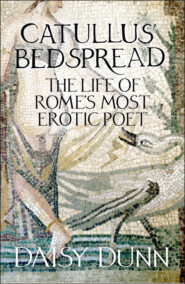
Полная версия:
Catullus’ Bedspread: The Life of Rome’s Most Erotic Poet

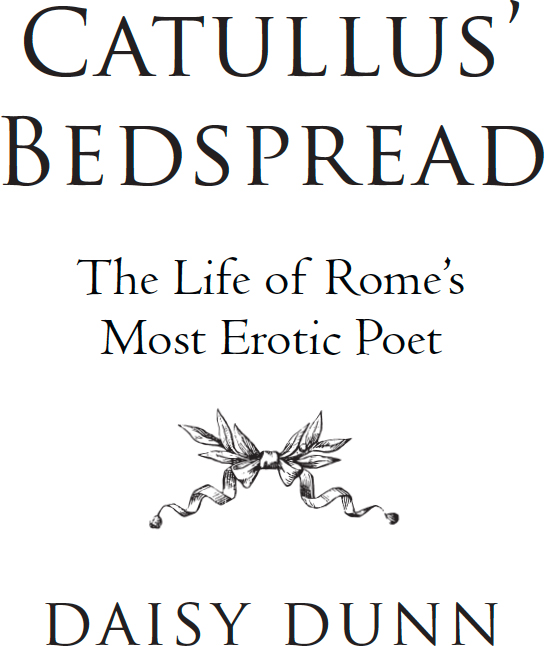

Copyright
William Collins
An imprint of HarperCollinsPublishers
1 London Bridge Street
London SE1 9GF
WilliamCollinsBooks.com
First published in Great Britain by William Collins in 2016
This William Collins paperback edition published in 2017
Copyright © Daisy Dunn 2016
Cover photograph © akg-images/Rainer Hackenberg
Maps by John Gilkes
Daisy Dunn asserts the moral right to be identified as the author of this work
A catalogue record for this book is available from the British Library
All rights reserved under International and Pan-American Copyright Conventions. By payment of the required fees, you have been granted the non-exclusive, non-transferable right to access and read the text of this e-book on-screen. No part of this text may be reproduced, transmitted, down-loaded, decompiled, reverse engineered, or stored in or introduced into any information storage and retrieval system, in any form or by any means, whether electronic or mechanical, now known or hereinafter invented, without the express written permission of HarperCollins.
Source ISBN: 9780007554324
Ebook Edition © ISBN: 9780007554348
Version: 2016-11-28
Praise for Catullus’ Bedspread:
‘A lively, finely crafted biography. Weaving well-researched social history with a compelling account of political machinations in Rome, the picture here is not just of a libertine prone to writing of his obscene desires, but a soulful man at the heart of a remarkable age’
Observer
‘For all those of us who love counting stars, none burns brighter in the literary firmament than that of Gaius Valerius Catullus – Dunn’s brilliant new biography of the Roman master will shine beams of light on his darkly passionate poetry’
Professor Paul Cartledge
‘The task of piecing together a biography from verse alone is one that Dunn performs with creativity and diligence’
The Times
‘Hugely enjoyable … Daisy Dunn lifts the lid on an era and world that remains engrossing two millennia on’
Catholic Herald
‘Dunn writes beautifully and clearly adores her subject. She deserves plaudits for bringing this fine poet and his tumultuous times so vividly to life’
Daily Mail
‘This is a rewarding, idiosyncratic book … Catullus would certainly applaud’
Country Life
‘Not since Nicola Shulman’s Graven with Diamonds has literary criticism seemed so thrilling. An imaginative, enriching and quick-witted book reminds us that Catullus is a poet for all time’
Standpoint
‘Lyrical, playful and startlingly original … Breathes extraordinary new life into the classical world. An unforgettable journey into the high art and low life of ancient Rome’
Dan Jones
‘Young classicist and art historian Daisy Dunn imaginatively revive[s] this most accessible of Roman poets … an intelligent and often original interpreter of the poetry [she] provides clear, direct and readable translations’
Financial Times
‘Enjoyable and diligently researched … Dunn is a sure-footed and elegant literary critic, particularly when it comes to poem 64, the scintillating mini-epic (Dunn’s own deft version is included as an appendix; and she has translated, with bright-eyed intelligence, all the poems in another volume.) … Catullus’ Bedspread is richly woven, and Dunn’s deep passion for her subject is patent’
Spectator
‘Any reader of Catullus will want to have this book’
Literary Review
Dedication
For my parents and my sister, Alice
Epigraph
This bedspread,
Embroidered with the shapes of men
Who lived long ago, unveils the virtues of heroes
Through the miracle of art
Contents
Cover
Title Page
Copyright
Praise
Dedication
Epigraph
Maps
Author’s Note
Timeline
Prologue
I: In search of Catullus
II: The house on the Palatine Hill
III: An elegant new little book
IV: Sparrow
V: The rumours of our elders
VI: The power of three
VII: I hate and I love
VIII: Farewell
IX: A sea of mackerel
X: Canvas
XI: The boxwood Argo
XII: Godly rumbling
XIII: The Roman stage
XIV: A flower on the edge of the meadow
Epilogue
Picture Section
Appendix: Poem 64 – Catullus’ Bedspread Poem
Note on Currency and Measures
Notes
Select Bibliography
List of Illustrations
Index
Acknowledgements
About the Author
About the Publisher
MAPS

Map of Italy and North Africa
Map of Greece and the East
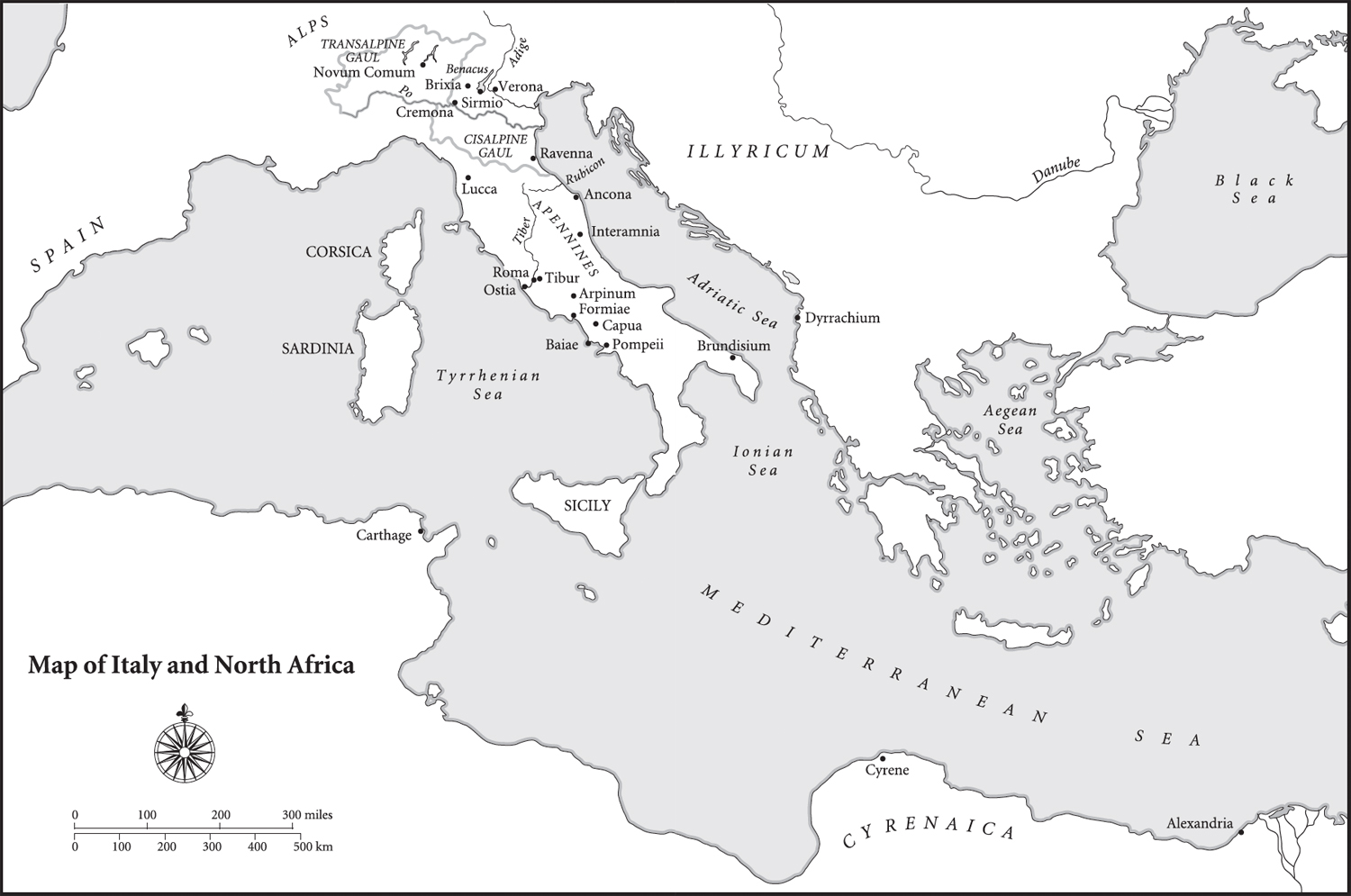
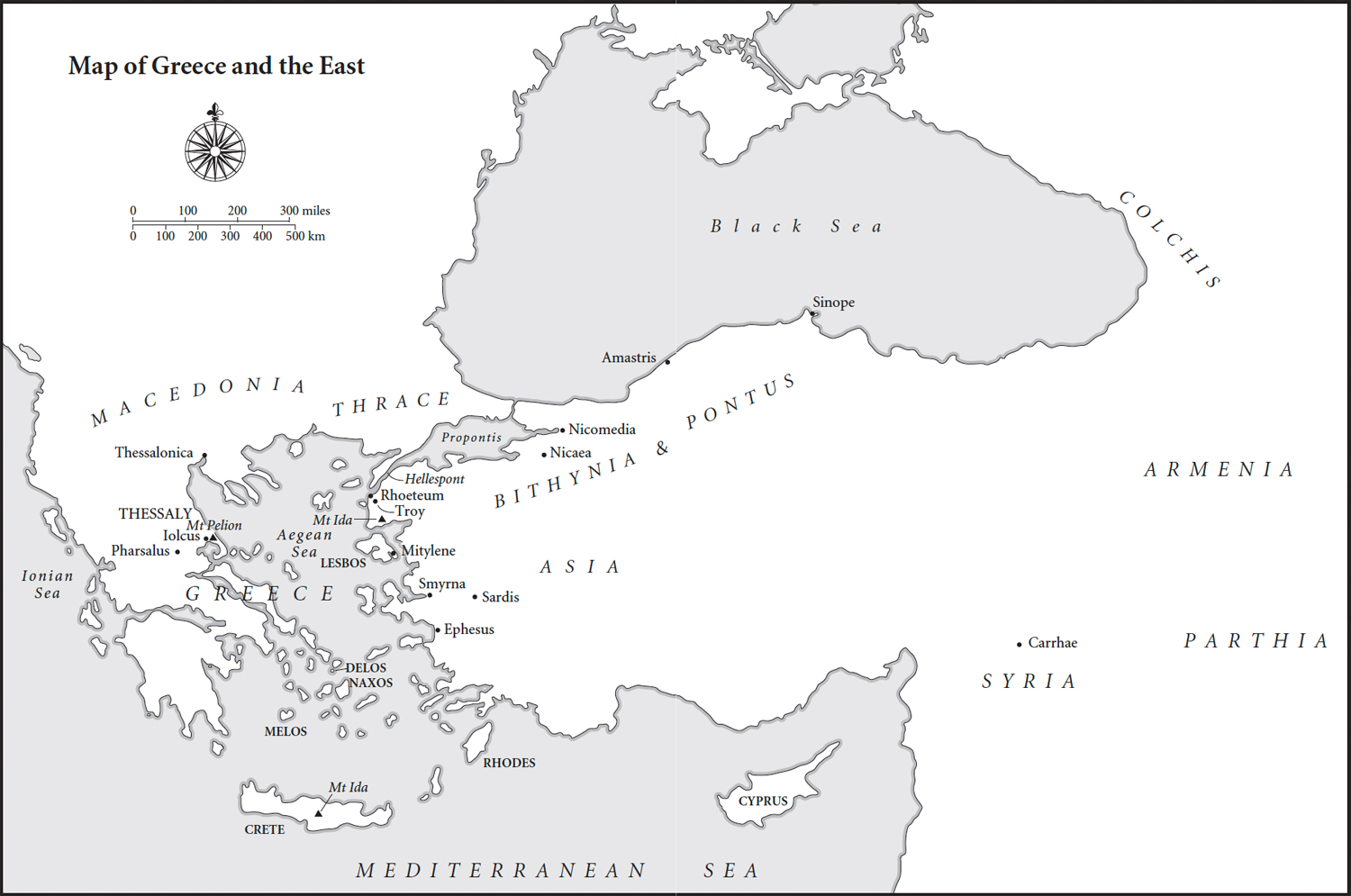
AUTHOR’S NOTE

The Political System in Rome
Politicians in Rome followed an established ladder of power. At the top sat two chief magistrates, known as consuls. Male citizens of Rome (aged seventeen and above) elected the two consuls each year, and the Senate guided them, while also managing the civic purse and foreign relations. The first consuls had been plucked from the richest families; the first senators’ descendants were the patricians, or aristocrats, of Catullus’ Rome.
Before a man could even think about becoming a consul, he needed to gain some experience. As he approached the age of thirty, a budding patrician politician would strive first to be elected as a quaestor, whose tedious responsibilities involved supervising the treasury. At the end of the year, funds permitting, quaestors became life members of the Senate, and the more appealing prospect of running for the senior magistracies, aedile, praetor, then consul, suddenly became feasible. Beyond the consulship, men could become censors, who routinely examined the membership of the Senate.
The Senatorial magistrates
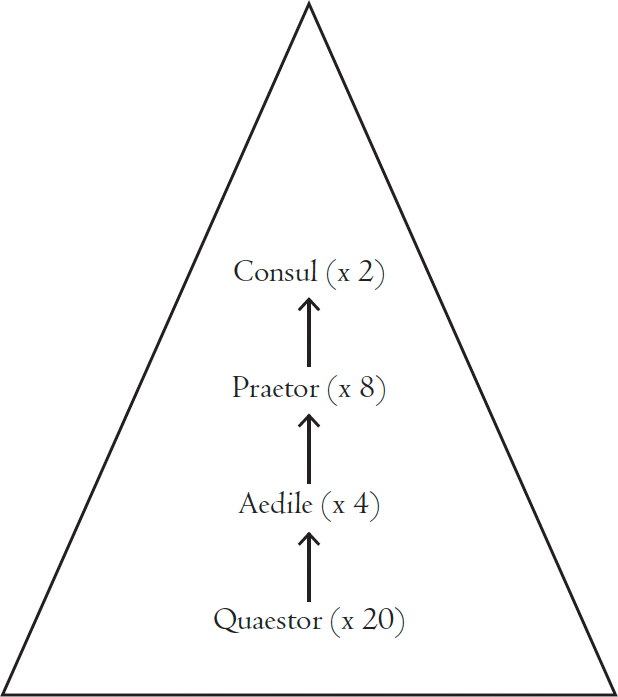
Before they could run for the senior magistracies, plebeian candidates, by contrast, could achieve the tribunate. Every year Catullus spent in Rome he would see ten tribunes of the people elected from the plebeian class, scurry off to their own assemblies to consider legislation, and veto measures, and each other, at will.
While the four aediles (two plebeian, two patrician) took charge of public works and entertainment, the eight praetors were as though deputies to the consuls, and oversaw legal matters, such as trials and disputes arising in the provinces. Few could wait until the end of the year, when they had the chance to proceed to a command overseas. The two consuls tended to progress to more senior foreign commands at the end of their year, too.
Men did not belong to political parties: they could change their allegiances at will. Some politicians aligned themselves with the optimates (‘best men’) who championed the Senate’s authority and sought to work with it; others with the populares, who sought a more liberal, reforming approach to policy by appealing to the tribunes to make their voice heard. Populares were often self-interested men who, cunningly veiling their personal ambitions, used the tribunes to propose legislation that would buy them the favour of the common man. The excessive ambition of individual tribunes would contribute to the fall of the Republic, a catastrophe that began less than a decade after Catullus died. A miserable period of civil war and dictatorship would take hold, at the end of which the Romans would bow their heads again to a sole ruler: the future Emperor Augustus.
TIMELINE

753 BC: Rome is founded
509 BC: Overthrow of Rome’s last king
218 BC: Hannibal the Carthaginian invades Italy
204 BC: Cybele, the Great Mother, is carried to Rome
133 BC: Tiberius Gracchus becomes tribune
91–89 BC: The Social War (Italian allies demand Roman citizenship); Verona becomes a Roman colony
88 BC: Sulla becomes consul. Beginning of the wars with Mithridates, King of Pontus
80s BC: Civil war between Sulla and Marius
c.82 BC: Birth of Gaius Valerius Catullus
81 BC: Sulla is proclaimed dictator
78 BC: Death of Sulla
70s BC: Ongoing conflict between Rome and Mithridates
73 BC: Spartacus leads a slave revolt
71 BC: Crassus defeats Spartacus, Pompey pursues the stragglers
70 BC: Consulship of Pompey and Crassus
67 BC: Pompey vanquishes pirates at sea
66 BC: Pompey succeeds the general Lucullus in spearheading the wars against Mithridates
63: Suicide of Mithridates. Cicero becomes consul. Conspiracy of Catiline
62: Clodius infiltrates the Bona Dea festival
c.61 BC: Catullus moves to Rome
61 BC: Trial of Clodius. Caesar governorship in Further Spain. Pompey, now returned from the East, receives his third triumph
60 BC: Metellus Celer and Lucius Afranius become consuls. Caesar returns from Spain
59 BC: Caesar, now part of a coalition (‘The First Triumvirate’) with Pompey and Crassus, becomes consul alongside Marcus Calpurnius Bibulus. Death of Metellus Celer
58 BC: Start of Caesar’s Gallic War. Clodius is tribune. Cicero goes into exile. Ptolemy XII Auletes is driven from his throne
57 BC: Catullus goes to Bithynia. After a considerable battle for his recall, Cicero returns to Rome
56 BC: Catullus returns from Bithynia and visits Lake Garda. Trial of Caelius Rufus. The triumvirs hold summits to repair their coalition
55 BC: Pompey and Crassus become consuls again. Opening of the Theatre of Pompey. Caesar’s first invasion of Britain
54 BC: Cato becomes praetor. Crassus leaves for Syria. Caesar’s second invasion of Britain. Death of Pompey’s wife (Caesar’s daughter) Julia
53 BC: The Battle of Carrhae and death of Crassus
c.53 BC: Death of Gaius Valerius Catullus
52 BC: Death of Clodius
49 BC: Caesar crosses the Rubicon, sparking civil war
48 BC: Death of Pompey
44 BC: Death of Caesar
PROLOGUE

GAIUS VALERIUS CATULLUS had endured a difficult night in Rome: ‘Undone by passion I tossed and turned all over the bed.’ He had spent the evening drinking wine and composing poetry, and was far too stimulated to rest. He longed only to taste daylight and swap stanzas once more with his friend and fellow poet, a small man named Calvus. Poetry remains the insomniac’s gift.
Catullus was as familiar with what it was like to have another warm ‘his chilly limbs in the bed you left behind’, as he was with the bedchamber that bore the remnants of lust:
Steeped in flowers and the oil of Syrian olive,
Knackered and tattered, pillows everywhere,
Creaking and shaking,
The trembling bedstead shattered
(Poem 6)
He also knew what it was like to obsess over a bedspread. Even when he didn’t have the stirrings of passion and unfinished lines circling his mind, the poet was seldom at rest. Born in Verona around 82 BC, Catullus moved to Rome, and travelled the south border of the Black Sea, where men waded with fine fishing nets and built boats shaped like beans. He made his way to Rome’s countryside, and to his family’s second home on a peninsula of Lake Garda. The hundreds of poems he wrote across the course of his short life were as varied as the landscapes he wandered.1
Catullus was Rome’s first lyric poet. He was also a conflicted man. At any one time he could hate and love, curse and censure, consider himself rich but call himself poor. While lending themselves perfectly to poetry, such extremes of emotion at times made his life unbearable. He wrote not only of the feelings that plagued his own mind, but of the way he felt about others, not least Julius Caesar, a man his father called a friend: in one particularly scabrous poem he described the politician and future dictator as little more than ‘a shameless, grasping gambler’.
One may ask why a collection of Latin poems from over two thousand years ago matters so much today. Catullus’ book is the earliest surviving poetry collection of its kind in Latin. Full of emotion, wit, and lurid insight into some of the key Roman personalities, it provides a rare and highly personal portrait of a life during one of the most critical moments in world history.
Catullus lived in some of the most uncertain and turbulent times Rome had ever known: the late Republic, before the emperors came to rule. Centuries earlier, kings had governed Rome until, as legend had it, the son of the haughty seventh ruler raped a woman named Lucretia, and her husband and his friend waged a war to destroy the monarchy forever. Its legacy lived on into the Republic, which was founded after the kings on the very principle that no one man should rule Rome again. Every year, the male citizens elected magistrates to govern their city under the guidance of the Senate. The political system was carefully calibrated to prevent power from falling into the hands of any one man, but the balance of power between Senate and individual magistrates had begun to swing increasingly in the magistrates’ favour, and they knew it.
So Catullus found himself surrounded by towering politicians: Pompey the Great, Marcus Licinius Crassus, Julius Caesar, who vied desperately for power over Rome and her empire, which was larger than it had ever been, and growing larger still. By the time Catullus was born, the Romans had made provinces of North Africa, Sicily, Sardinia, and Corsica; Spain, which they divided into two provinces, Nearer and Further; Transalpine Gaul, stretching across the south of France and north-east into Switzerland; Cisalpine Gaul, which encompassed northern Italy, including Catullus’ Verona; Macedonia; Asia (western Turkey), and extended their global rule through numerous allied states.
Ever inquisitive, Catullus cast his eye across this tremendous world map as well as the more insular world of Roman politics. One moment he would find himself recounting adventures at sea in breathless syllables; the next, describing a private dinner with friends; the next, weeping that his lover did not feel things as intensely as he.
Perhaps it is because our ideas about ancient poetry are so coloured by the awe-inspiring epics of Homer and their lofty themes of humanity that many of Catullus’ poems seem so surprising and immediate. While some of his poems are highly learned and erudite, others are mischievous, goatish, direct. With characteristic boldness, he requests a woman he loves to:
Give me a thousand kisses, then a hundred
Then another thousand, then a second hundred.
Then – don’t stop – another thousand, then a hundred …
(Poem 5)
In Latin these lines begin so abruptly – da, dein, deinde – it is as if we hear them with Catullus’ quickening heartbeat. I was seventeen when I first discovered them, and they made Catullus feel more alive to me than any other poet I knew. I have read them hundreds of times since, and they still have the same effect.
One of the reasons Catullus’ poems are still so readable I think is that they show that the people of his world were not always so very different from us. The characters he encounters and describes in the streets and bawdy inns of Italy call to mind the stock cast of a Roman comedy – or even a scene in late-night Soho – teeming with heartbroken lovers, drunken cavorting youths, old men pining for women a fraction of their age, money-grabbing brothel-keepers, mercenary meretrices (prostitutes), slaves who know too much.
Catullus’ immense skill as a poet lay in his ability to combine many literary genres in the Latin tongue, not just elements of comedy, but the clarity of Sappho, the celebrated female poet, the compact and erudite style of Hellenistic poets, and the wit of lewd graffiti in Rome, with themes as various as love, the writer’s life, and the myth of Jason and the Argonauts. The Roman province of Macedonia incorporated much of mainland Greece, and in Catullus’ day Greek culture had well and truly permeated Rome’s own.
While never enslaved to his Greek predecessors, when he wanted to be particularly learned, Catullus adapted their poetic ideas to convey them with new feeling. He forged new Latin words and was partial to diminutives (miselle passer – poor little sparrow; scortillum – little tart). He feverishly combined elegantly phrased sentiment with colloquialism and obscenity, unnerving the more serious Romans who believed that a jibe at one man’s sexual inadequacy was what high-spirited youths scribbled on walls and brandished in tense moments, not what educated writers preserved in fine papyrus scrolls. His work would therefore prove unsettling for some of the older generation, as well as important public figures such as Cicero, the great orator, who had rather conservative tastes.
Such readers in Rome were used to epic and chronicles and meandering excursus on the history that made Rome august. They had the patience to work through manual-like offerings on farming, if not to write them. Prior to Catullus, a cluster of poets, including the little-known Laevius and Valerius Aedituus, had tried to capture the liveliness of the Greek poets in Latin, but their attempts would not generally prove as successful as his; their names are obscure today as a result of the poor survival of their work. Catullus did not shirk sobriety, but framed it unexpectedly and with a finesse of the kind that many of his literary predecessors lacked.
The apparent simplicity of Catullus’ poetry often masks far greater, deeper sentiment and subtlety of thought. He helped to shape the genre of Latin love elegy by writing a sustained series of poems to a lover. Ovid, Virgil, Horace, Propertius, Tibullus: all were influenced by his work. So Ovid, in a book of love elegies, confessed that he had a wandering eye and could not help but feel attracted to many different women: ‘I hate what I am but, though I long to, can’t fail to be what I hate.’2 It is a striking line, but partly because it is a response to one of Catullus’ most remarkable poems which begins: ‘I hate and I love’ (Poem 85). The Latin love-poet Propertius, who was about thirty years younger than Catullus, pledged that his poetry would make the beauty of his mistress Cynthia most famous of all, ‘pace Catullus’.3 Catullus remained a monumental figure of reference for the poets who sprang up over the decades following his death.
In his pithy observations of day-to-day life and bitter polemic against his enemies, Catullus also pre-empted the great satirists of the Roman Empire, particularly the writers Martial and Juvenal. He called his poetry nugae (‘ramblings’, or ‘sweet nothings’) partly out of false modesty, but with the understanding that the word also meant ‘mimes’.4 Many of his poems offer vignettes, at once silent and resounding with the colourful characters he observed.
There are secrets and allusions in Catullus’ Latin which take some teasing out, but once found, throw Catullus’ poetry in a more dazzling light than one could ever have imagined. As soon as I realised this, I decided that I wanted to know Catullus, to read his work with the emotion with which it was written, to get as close as I could to this man who lived more than two thousand years ago. And so I began to write this book, which I hope will inspire others to discover, or rediscover, his exquisite poems.

There are very few surviving sources for Catullus’ life. Practically everything that can be known about him must be extracted from his book of poetry. This may resemble a series of jumbled diary entries, describing episodes from his life, but Catullus wrote it for public consumption, and not necessarily as a faithful account. He addressed love poems to a certain ‘Lesbia’, for example, a woman he gave life to through his verse. Lesbia was a pseudonym for Clodia Metelli, the eldest sister of a wealthy and influential politician in Rome.5
Of the 117 poems which survive in his collection, none bears a title. They are traditionally numbered according to the order in which they appeared in the earliest manuscripts, which is neither chronological nor entirely thematic, but hardly random either. Like a good music album, there is style in the progression and unexpected swing of one story to another, back and forth in time. It might have been a poet who established the poems’ order.
Catullus was much more than a love-poet. His poems to Lesbia form only a fraction of his book. The longest and most accomplished poem that survives, Poem 64, makes no explicit mention of her at all, focusing instead on a luxurious bedspread. I like to call it Catullus’ ‘Bedspread Poem’ because it contains as its centrepiece a long, digressive passage on the myths that adorned the wedding bedspread of one of Jason’s Argonauts. In it, Catullus set the themes of love and war against the backdrop of the myth of the Ages, a sequence of five eras against which writers of ancient Greece and Rome mapped their semi-mythical history.6
The first of these eras was the Golden Age, an idyllic, Garden of Eden-like time when there was no work, no war, no sickness, no travel; the earth gave freely and amply of its own accord, and gods and men lived harmoniously. There followed an inferior Silver Age, which Jupiter, king of the gods, destroyed since its people were criminals who no longer offered sacrifice to the gods. A Bronze Age came about, dominated by warfare and weaponry. Its people destroyed each other. Then followed the Heroic Age, which offered a reprieve from the decline, a time of heroes descended from the gods themselves, warriors who fought in the Trojan War, and Jason and his Argonauts. When they died, an Iron Age arrived. It was the worst of the five eras, an age of anxiety, pain, hard work, and murder. The Iron Age myth was a fitting tribute to the grim realities of late Republican Rome.



